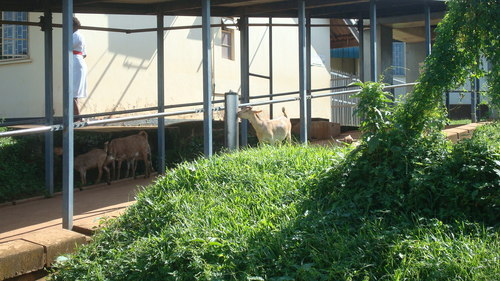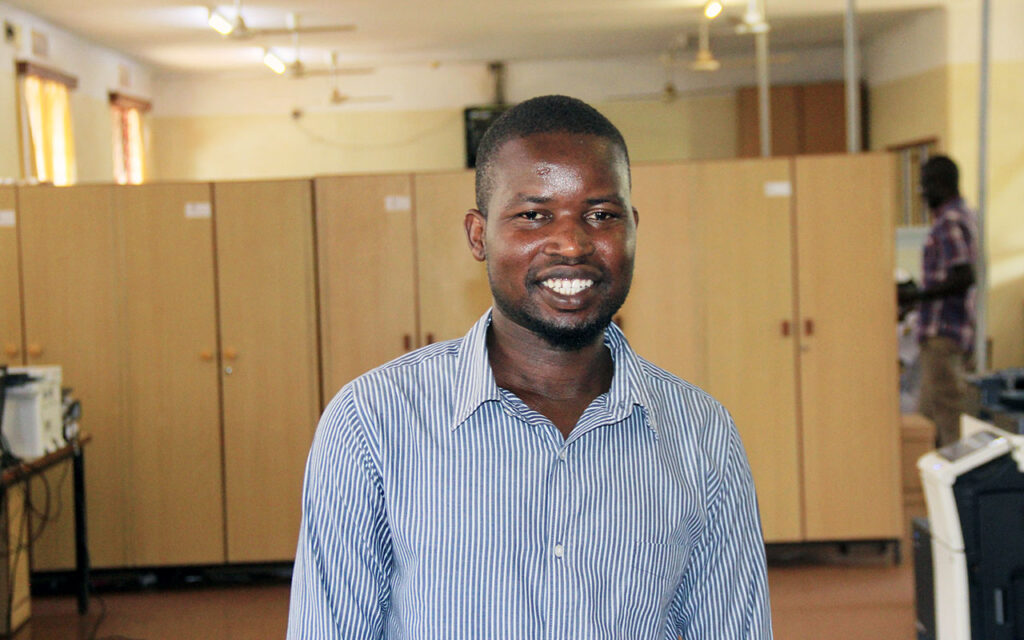It’s screening day – so why are there goats?

Well, it’s not everyday you stroll around the grounds of a national teaching hospital and encounter a herd of goats. Just another day in Mulago. As Jemma said, “No-one should ever complain about the NHS.”
Patient-testing day started out as a testing day for us all. We were not quite sure how many would turn up or what the day would bring. Inevitably, later than planned (African time again) the nursing staff began to arrive. And then the patients began to arrive. And so did the press. And where were the blood test requisition forms?
After much delay we were able to start bringing the patients through for clinical history taking (apparnetly a novel experience in Uganda). Some of the stories we heard were heart rending. The stand out for Kate was the mother of a 5-year-old boy with haemophilia who brought her baby for testing. “She doesn’t yet know that her baby has got haemophilia. That’s a hard thing to take on board in the UK. But out here, having another child with haemophilia, and knowing there’s no treatment, must be catastrophic. At Great Ormond Street we’d have tested him at birth but she’s spent months just hoping he will not have haemophilia.”
For physio Nicola, it was the three brothers aged 23, 21 and 19, who could hardly walk but were incredibly cheerful. “They came in on crutches, with one in a wheelchair. It was heartbreaking.”
But there was hope too. Both Kate and Nicola visited Kampala last year and today were amazed to see 12-year-old Waswa walk in to the clinic using a single crutch. Some time ago, following a knee bleed he was referred by a rehabilitation centre to a knee surgeon, who had biopsied his knee and removed a blood clot. He set the knee in extension. After being re-examined in theatre the knee was set bent. “When we saw him a year ago, he’d been unable to walk or even to put both feet on the ground. He was crying a lot and needed morphine for the pain.” Haemophilia A was assumed and he was given two weeks treatment with factor. The orthopaedic surgeon wanted to fix his knee in extension so he could get his foot to the floor, but we advised daily physiotherapy,” said Kate. Today he was able to walk in to have his levels tested … accompanied by two symptomatic uncles.
For Waswa, clearly, inappropriate medical intervention only worsened his underlying condition, whereas on the basis of clinical signs and symptoms and a proper clinical history and family tree could have prevented so much pain.
A mother with three young boys with poor joints also demonstrated the importance of thoroughly probing the patient’s back-story. Taking their history, Kate guessed from the names that two were twins, albeit they were of different ages. Through Joseph, our interpreter, it emerged that one child had a twin brother who at 10 months had fallen, hit his head and been put to bed but didn’t wake up. Unsurprisingly, the lab results confirmed severe haemophilia in all three boys.
In all, around 50 people attended for testing. A few clearly had no bleeding history at all and just wanted to be tested. But around 45 patients had clear symptoms and were bled. After they were all seen, we headed over to the laboratory, where Angus’s team were coming up with diagnoses that fitted the clinical pictures and impressions gained by Great Ormond Street’s finest. As Kate said, “the fact that those lab technicians were only trained to do that by Angus two days ago was absolutely amazing.” Jemma concurred: “They were so engaged and enthusiastic in the lab about what they were doing.”
Clearly the lab training aspect really works and will be a great success provided there is some level of sustainability within the hospital. What may be needed as a bolt on to this kind of initiative is some form of hands-on training programme for the nurses rather than the more formal teaching approach. The Mulago nurses are clearly well practised in taking bloods, but we did wonder whether they really understood the intricacies of taking bloods for clotting tests: we found out later that some samples had haemolysed. Jemma noted that they did not communicate with their patients in the way that UK nurses do. “It’s a completely different type of interaction.” As it looked as if we might not get all the waiting patients bled, Jemma was so happy when the Mulago nurses finally allowed her to roll up her sleeves and bleed some babies.
Mike Holland is the founder of Haemnet and The Journal of Haemophilia Practice


